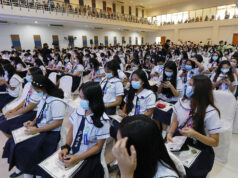CHR to boost inquiry on human rights violations in drug war, Mindanao martial law
THE COMMISSION on Human Rights (CHR) aims to strengthen its investigation on human rights violation cases in relation to President Rodrigo R. Duterte’s nationwide war on drugs in 2019.
“Right now, we are still investigating approximately 1,400 cases, involving approximately 1,700 victims. We aim to strengthen our investigation services next year,” CHR Spokesperson Jacqueline C. de Guia said in a phone interview with BusinessWorld on Dec. 21.
“We have also looked into allegations of human rights violations in Mindanao amid the continuation of martial law. Right now, we are investigating and verifying 155 cases in Mindanao,” she added.
Ms. de Guia noted that the lack of cooperation from the Philippine National Police (PNP) is the main challenge in CHR’s investigations.
She said the police stance stems “from a directive from the Executive… to prohibit their units from providing [CHR] with copies of reports of police investigations.”
“That definitely hindered our investigations,” Ms. de Guia said. “Apart from that, of course, there was a continuing climate of fear that was very much apparent in the communities where we investigated these cases.”
As for the alleged extrajudicial killings (EJKs), she said: “We have noted that 55 cases have been filed…. The Kian delos Santos case [was] a small victory which we hope will be followed by more cases filed.”
“It is an opportunity for the Philippine government to demonstrate that it is willing and able to investigate all of these [EJKs] cases,” she added.
If the government takes advantage of this opportunity, she continued, the International Criminal Court (ICC), which is looking into complaints filed against Mr. Duterte in relation to the drug campaign, “will have a reason not to go to the next stage” of the probe.
“So that was our call all along, during the previous months, that the government should take advantage of the opportunity to demonstrate its willingness and ability to file more charges,” she said.
The CHR spokesperson also said that another challenge that the commission faced in 2018 “was the vilifying of human rights defenders.”
She said being a “human rights defender” nowadays has “a negative connotation, particularly because of the attacks made by the government” against them.
Mr. Duterte has repeatedly lambasted individuals, mostly human rights activists, who have been critical of his controversial anti-drug campaign.
In his third State of the Nation Address (SONA) last July, Mr. Duterte told his critics: “Your concern is human rights, mine is human lives.”
“Also one of the challenges faced by the human rights community was the red-tagging, labelling human rights defenders as terrorists, which made it very difficult for us to carry out our work…. There were also acts carried out against journalists, against the media…curtailing press freedom, including their right to assembly,” Ms. de Guia said.
MIGRANT WORKERS
In another concern, the CHR will conduct an inquiry on the conditions of Filipino migrant workers next year.
Ms. De Guia said the commission is “hoping to already start next year a national inquiry on migrant workers” to look into their plight and the challenges they face.
“Hopefully, we will be able to come up with recommendations on polices that will alleviate their condition,” she said.
During the 32nd Association of Southeast Asian Nations (Asean) Summit in Singapore last April, President Rodrigo R. Duterte pushed for the protection of migrant workers by promoting the further implementation of the ASEAN Consensus on the Protection and Promotion of the Rights of Migrant Workers. — Arjay L. Balinbin



